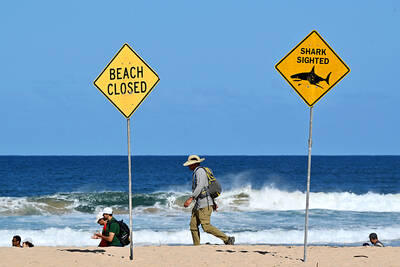Government complacency over the perils of dengue fever is responsible for the current infection spike and the spread of the mosquito-borne disease in several Asian nations, experts said yesterday.
A commercially available cure, they add, may also be more than a decade away.
"Dengue is one of these neglected diseases ... it's basically been ignored for many, many years," Duane Gubler, director of the Asia-Pacific Institute for Tropical Medicine and Infectious Diseases in Hawaii, said.
"We don't do anything until there's a crisis, and then we try to react to it and it's always too little, too late," Gubler said on the sidelines of the three-day Asian Dengue conference in Singapore.
Several Southeast Asian countries have recently declared war on dengue. Singapore's infections so far this year reached 10,951 last week, far surpassing its previous high of 9,459 set last year. There have been 11 fatalities, a record.
Malaysia, Thailand and Philippines have also issued health advisories and warnings.
Governments need to be proactively dedicating resources to research for drug and vaccine development, Gubler said, and should constantly educate the public on preventing mosquitoes from breeding in their homes.
Dengue is only spread by the Aedes mosquito.
Gubler, who has been researching dengue fever for 35 years, said the spread of the disease globally was intensified by increased urbanization and advances in international transportation.

With much pomp and circumstance, Cairo is today to inaugurate the long-awaited Grand Egyptian Museum (GEM), widely presented as the crowning jewel on authorities’ efforts to overhaul the country’s vital tourism industry. With a panoramic view of the Giza pyramids plateau, the museum houses thousands of artifacts spanning more than 5,000 years of Egyptian antiquity at a whopping cost of more than US$1 billion. More than two decades in the making, the ultra-modern museum anticipates 5 million visitors annually, with never-before-seen relics on display. In the run-up to the grand opening, Egyptian media and official statements have hailed the “historic moment,” describing the

SECRETIVE SECT: Tetsuya Yamagami was said to have held a grudge against the Unification Church for bankrupting his family after his mother donated about ¥100m The gunman accused of killing former Japanese prime minister Shinzo Abe yesterday pleaded guilty, three years after the assassination in broad daylight shocked the world. The slaying forced a reckoning in a nation with little experience of gun violence, and ignited scrutiny of alleged ties between prominent conservative lawmakers and a secretive sect, the Unification Church. “Everything is true,” Tetsuya Yamagami said at a court in the western city of Nara, admitting to murdering the nation’s longest-serving leader in July 2022. The 45-year-old was led into the room by four security officials. When the judge asked him to state his name, Yamagami, who

‘CHILD PORNOGRAPHY’: The doll on Shein’s Web site measure about 80cm in height, and it was holding a teddy bear in a photo published by a daily newspaper France’s anti-fraud unit on Saturday said it had reported Asian e-commerce giant Shein (希音) for selling what it described as “sex dolls with a childlike appearance.” The French Directorate General for Competition, Consumer Affairs and Fraud Control (DGCCRF) said in a statement that the “description and categorization” of the items on Shein’s Web site “make it difficult to doubt the child pornography nature of the content.” Shortly after the statement, Shein announced that the dolls in question had been withdrawn from its platform and that it had launched an internal inquiry. On its Web site, Le Parisien daily published a

DEADLY PREDATORS: In New South Wales, smart drumlines — anchored buoys with baited hooks — send an alert when a shark bites, allowing the sharks to be tagged High above Sydney’s beaches, drones seek one of the world’s deadliest predators, scanning for the flick of a tail, the swish of a fin or a shadow slipping through the swell. Australia’s oceans are teeming with sharks, with great whites topping the list of species that might fatally chomp a human. Undeterred, Australians flock to the sea in huge numbers — with a survey last year showing that nearly two-thirds of the population made a total of 650 million coastal visits in a single year. Many beach lovers accept the risks. When a shark killed surfer Mercury Psillakis off a northern Sydney beach last